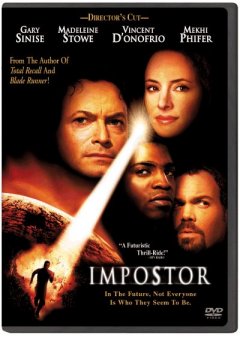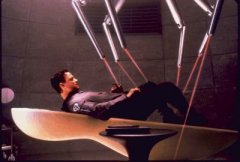|
Impostor
Impostor
Rating: R
Release Date: July 9, 2002
Version: Director's Cut
Running Time: approximately 102 minutes
Ten-second Rundown: Spencer Olham has built a bomb that could defeat the alien Centauris, but his own government thinks he is a Centauri cyber-bomb himself.
Extras:
The Impostor Files featurette Original short film Theatrical trailer Technical Specifications: Widescreen (1.85:1) enhanced for 16x9 televisions, Dolby Digital 5.1 Surround, Spanish subtitles
Choice Scene: Creepy but beloved character actor Tracey Walter as a sci-fi version of a crazy old coot.
A few years ago Miramax had a cool idea to do an anthology film. The studio hired three directors to do shorts involving science fiction love stories. You may have noticed by now that that film never came out; instead, one of those shorts, Impostor, got sent back to the director with instructions to turn it into a full-length feature.
Not a particularly flashy film in either effects or star status, Dimension (the "genre" division of Miramax) dumped Impostor in the middle of the Christmas season, where it quickly disappeared. This did director Gary Fleder's work a disservice, as Impostor is a fairly thoughtful science fiction entry (based on a short story by Philip K. Dick) that works pretty well on video.
Gary Sinise produces and stars as Spencer Olham, a brilliant scientist working for the Earth Government. Deeply in love with his wife Maya (Madeleine Stowe), a doctor, Olham has a pretty secure life in a world on the edge. For at least thirty years, our planet has been at war with the vicious Centauri, a faceless enemy (as far as the movie presents them, anyway) that is, according to Olham's voice-over, "…genetically superior to humans."
As a result of this war, a near-fascist government rules, led by the high and mighty Chancellor (Lindsay Crouse). She'll be coming to Olham's lab to see his finest achievement: a bomb that should easily destroy Centauri ships. But the mysterious ESA agent Major Hathaway (Vincent D'onofrio) has intercepted a Centauri communiqué claiming that Spencer Olham has been replaced by a genetic cyborg bomb that only thinks it's Olham. Its target: The Chancellor.
Like much of Dick's work, Impostor delves into the question of identity, and the very meaning of self. Hathaway claims that the Centauri can duplicate Olham's memories, but they cannot take his soul. But if the man who thinks he's Olham behaves with the same conflicted compassion (Olham built the bomb but longs for peace), how could he not be Olham?
The movie meanders off-topic a bit to become a long chase scene, and it's in those moments meant to pad it to feature length that Impostor runs a little awkwardly. Just in case you missed the thematic connection to Blade Runner (based on Dick's Do Androids Dream of Electric Sheep?), the script starts referring to Olham as a replicant, taking him out into a bombed-out city that owes more than a little in concept to Ridley Scott's vision.
There Olham runs into Cale (Mekhi Phifer), one of the few healthy humans in "the zone." The two reach an agreement to get Olham back into the city and to the Veteran's Hospital, where Olham can perform a molecular test to prove his identity, and Cale can steal enough pharmaceutical supplies to save his people.
But Fleder has added a few twists of his own. The soundtrack carries a couple of bites that sound like fascist rallies are happening somewhere in the city. And Olham's ambivalence toward the war clearly comes before the accusation that he's not who he thinks he is.
Though the DVD extras are pretty sparse, including the usual behind-the-scenes featurette, Miramax has included the original short film. Comparing the two reveals surprising differences. The short actually ends up being more complex emotionally, with the implication that the war may actually be part of a government scheme. Though the Centauri don't appear in either version, the short has sympathy for the aliens. In the final film, however, it's clear that while the government may have its flaws, they're nothing compared to those rat bastard aliens that killed Olham's dad.
Truth be told, the short works a little better, but either version makes good watching. Now if they could only dig up the other two shorts from the anthology…
Get Impostor (Director's Cut) at Amazon.com















